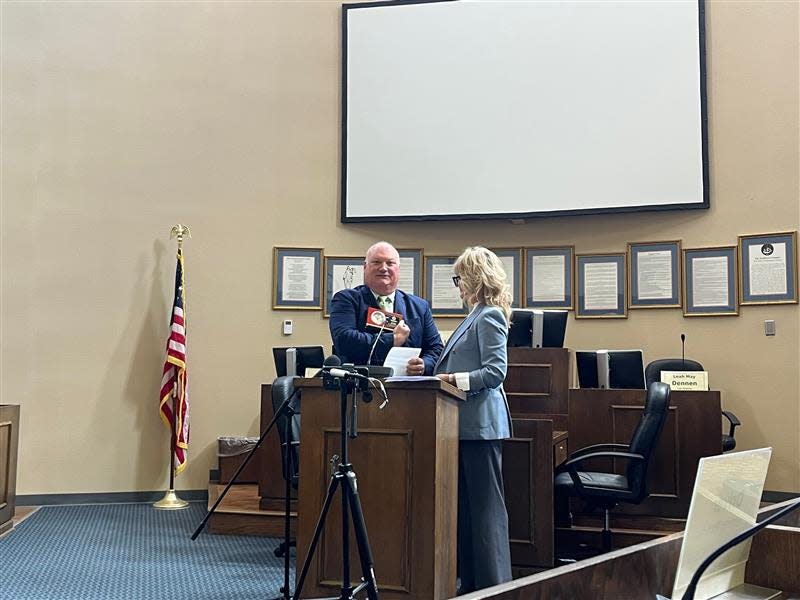9/11 attacks nearly kept a life-saving organ from an infant. Here’s how we met the moment.
Each September, as we remember the lives lost in the worst terrorist attack on American soil, I also remember one child saved by another young child’s gift of life – and the extraordinary story of how it happened against impossible odds.
Even before the planes struck the Twin Towers in New York City on September 11, 2001, tragedy and hope were hanging in the balance that morning between one family that had made the selfless decision to donate and another desperately waiting for a liver transplant for their 6-month-old baby, Kareena.
These two families were separated by 750 miles.
My colleagues and I at Tennessee Donor Services (TDS), the non-profit responsible for facilitating organ donations and transport to waiting recipients, were orchestrating plans to fly the precious liver to Houston as quickly as possible.
Then in an instant, our nation was frozen in shock by incomprehensible destruction. Everything seemed to stop in its tracks, even time itself, while all eyes turned to New York City, Pennsylvania and Washington, D.C. where planes had been turned into weapons and killed thousands.
Hear more Tennessee Voices: Get the weekly opinion newsletter for insightful and thought provoking columns.
Everyone wanted to help transport the organ despite the odds
But for America’s first responders, time could not stop. That included our team at TDS, the first responders of organ donation. We had to get that liver to Houston, and we were racing against time, just like it is every time, as most organs can only survive for a few hours outside the human body. But how? All flights accessible to us were suddenly grounded.

We knew the odds were against us, but we had to do everything we could to honor one child’s gift by saving another - even on one of the worst days in modern American history. My first thought was to call the airport air traffic control. I found a number for Nashville International Airport “Tower” in the phone book. Despite the chaos, someone answered.
They were willing to help, but they didn’t have the authority to get a plane into the skies.
Everyone we came in contact with that morning wanted to help and were determined. They understood the stakes and offered to assist.
Sign up for Black Tennessee Voices newsletter:Read compelling columns by Black writers from across Tennessee.
Through a combination of instinct, adrenaline, dedication, and unshakeable trust, we all worked together. Ultimately, a Tennessee Air National Guard crew was cleared to fly the liver to Houston. It was the only plane on a non-military mission in the sky that day.
Twenty-two years later, the baby in Houston is now a healthy young woman who recently graduated from college. Knowing that she has her whole life in front of her always reminds me of how hope can emerge from tragedy – which is the essence of the medical miracle that is organ donation. I am also reminded of the reason this medical miracle is possible in the first place: because heroes and the families who love them say “yes” to donation.
Sign up for Latino Tennessee Voices newsletter:Read compelling stories for and with the Latino community in Tennessee.
Donor families and those who support them are an unstoppable force
Thanks to them - and to the people who work tirelessly in this field, surmounting whatever odds they encounter to make donation happen – more than 100 lives are saved every day in the U.S. through organ transplants.

In fact, the U.S. organ donation system is thebest one in the world thanks to countless first-responder recovery teams across the country that work around the clock to secure an ever-increasing number of donations and transplants each year.
In addition to ensuring donated organs are delivered to patients in need, our teams also continue to support and advocate for the families whose loved ones have been the gift of life to others.
To past, present and future organ donors, take this to heart: We’ve navigated uncertain circumstances every day for decades. Our volunteers, patients, donor families and medical experts are an unstoppable force. We will keep navigating and persevering for the people who depend on this work - no matter what happens. It’s what we do.
Today, organ donation and transplantation in the U.S. is undergoing significant change. Not only in the processes and policies that govern the system but also in the new technologies and practices we are using to increase the number of lives saved each year. Yet as we evolve, we cannot forget the spirit that makes us who we are, and that is behind every single one of the one million lives saved over the past 40 years.
The people of Tennessee are essential to keeping that spirit alive. Every life saved through transplant starts with a donor.
Today, we urge you to consider being the gift, as well. If you are not registered as an organ donor.
September – a month when we remember so many heroes – is a great time to do it.
It only takes a minute to visit bethegifttoday.com. Thank you so much.
Jill Grandas is executive director of DCI Donor Services.
This article originally appeared on Nashville Tennessean: 9/11 lessons: How we got a life-saving organ to an infant in need

